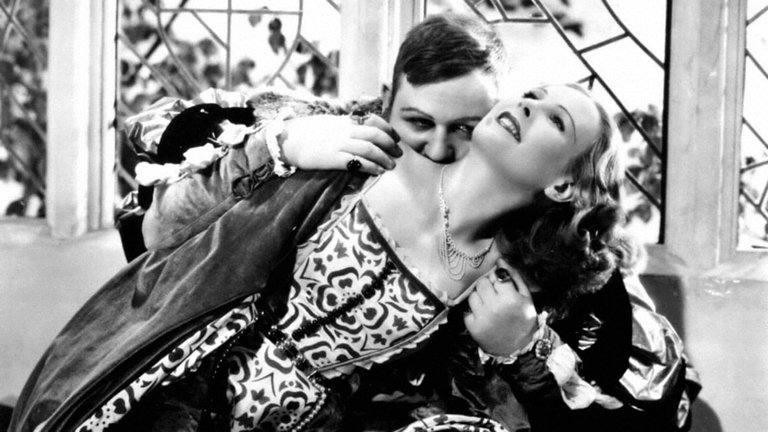Film Review: The Private Life of Henry VIII (1933)

In the first half of the 20th century, Britain maintained a formidable empire, yet its cinema industry lagged behind emerging powerhouses like Hollywood and continental Europe. Alexander Korda, a Hungarian immigrant, emerged as a pivotal figure in reshaping British cinema, while laying foundation for cinema empire of his own. His 1933 historical biopic, The Private Life of Henry VIII, marked a significant milestone by giving British cinema its first major international triumph.
Produced during the Great Depression, Korda was determined to provide audiences with escapist entertainment. Drawing on his rich experience, which included a multi-year stint in Hollywood, Korda crafted a lavish production with elaborate sets and costumes that rivalled the spectacles of Hollywood. Despite a relatively low budget, he succeeded in delivering a visually stunning cinematic experience, though the film's sound quality and music were slightly subpar. Korda was further motivated to pay homage to his future adopted country by celebrating its history. The Tudor era was seen as a golden age, a stark contrast to the economic woes and social strife of Depression-era Britain.
The script, co-written by Lajos Biro and Arthur Wimperis, takes a highly selective approach to the life of Britain's most colorful monarch, English King Henry VIII (played by Charles Laughton). The film's opening execution of Anne Boleyn (played by Korda's future wife, Merle Oberon) sets the stage, and it follows Henry's subsequent four marriages, culminating in his later years under the domineering influence of Catherine Parr (portrayed by Everley Gregg). Notably, Henry's first wife, Catherine of Aragon, is entirely omitted, with the authors openly admitting in film’s titles that she was not deemed "interesting" enough.
The film plays fast and loose with historical accuracy, glossing over the religious issues that were central to Henry's reign. However, Biro's and Whimperis’ script cleverly weaves in contemporary political commentary, using Henry to advocate for positions popular in interwar Britain, such as the need for a strong navy and a disdain for Franco-German rivalry, which was seen as source of strife and bloodshed in Europe, including recent Great War. The script also blends historical events with a generous dose of black humour and cynical observations on Henry's eventful rule, offering a unique perspective through the eyes of the lower classes – a nurse, a barber, executioners, servants and commoners. Private Life benefited a lot from not being constrained by heavy censorship of Hays Code that would take effect in Hollywood a year later, resulting in treatment of sex that was unusually open and candid for 1930s standards.
The film's greatest strength lies in its inspired cast, particularly Charles Laughton's iconic portrayal of Henry VIII, that would be repeated twenty years later in Young Bess. Laughton's performance, which earned him the Oscar for Best Actor and the first Oscar in British cinema history, would go on to establish the popular image of that monarch as obese, crude, gluttonous, lustful and easily manipulated, a perception that has been largely challenged by historians since. Laughton's chemistry with his real-life wife, Elsa Lanchester, who played the less glamorous Anna of Cleves, added depth to the film's character dynamics and provided some of the film’s most delightful scenes. In contrast, the romantic subplot involving Henry's ill-fated courtier, Thomas Culpeper (played by Robert Donat, future screen idol of British cinema), and Henry’s fourth wife, Katherine Howard (played by Binnie Barnes), felt less compelling.
The Private Life of Henry VIII, with its easily digestible running time of hour and half, is recommendable even to modern viewers. On the other hand, it suffers from comparisons with later screen depiction of the protagonist and its era, sometimes mainly because of lacking colour, which includes television series The Six Wives of Henry VIII and The Tudors.
RATING: 6/10 (++)
Blog in Croatian https://draxblog.com
Blog in English https://draxreview.wordpress.com/
InLeo blog https://inleo.io/@drax.leo
Hiveonboard: https://hiveonboard.com?ref=drax
Rising Star game: https://www.risingstargame.com?referrer=drax
1Inch: https://1inch.exchange/#/r/0x83823d8CCB74F828148258BB4457642124b1328e
BTC donations: 1EWxiMiP6iiG9rger3NuUSd6HByaxQWafG
ETH donations: 0xB305F144323b99e6f8b1d66f5D7DE78B498C32A7
Posted using CineTV
Me encantó!!!